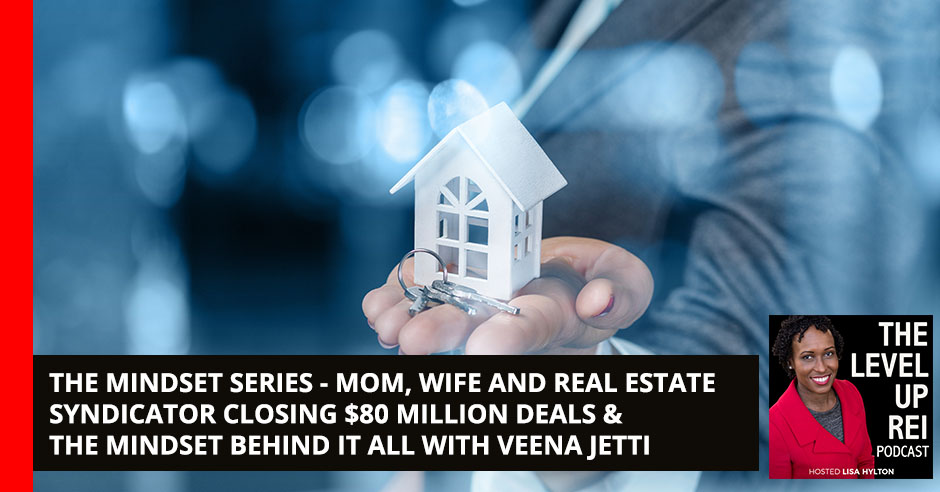
Risks will always be present in real estate investing. In order to move forward, one must learn how to properly mitigate them and put the advantages in their favor. Real estate syndicator Veena Jetti understands this well, and that’s why her team was still able to secure a profitable deal even in the middle of a tough pandemic market. She joins Lisa Hylton in discussing the right way to venture into real estate investing even with all the risks present, especially when to know the right time to step back and look for more desirable deals. She also shares her advantages as someone who came from a real estate family and her experiences as a full-time working mom of twin toddlers.
—
Watch the episode here
Listen to the podcast here
The Mindset Series – Mom, Wife And Real Estate Syndicator Closing $80 Million Deals & The Mindset Behind It All With Veena Jetti
I am excited because I have been working on a series exploring the impact mindset has on achieving your goals, be it real estate, career or business but most importantly, your ability to create the life you truly want. In this episode, I am honored to have Veena Jetti. She is a Real Estate Investor and the Founding Partner of Vive Funds, a unique commercial real estate firm that specializes in curating conservative opportunities for investors. Veena brings a dynamic perspective to targeting, acquiring, managing and operating assets using best practices combined with cutting-edge technologies. Her professional expertise includes driving corporate strategy and business development opportunities. Welcome to the show, Veena.
Thank you for having me. I’m excited to be here.
You are a real estate investor and we are going to talk about mindset and the impact mindset has on your business as well as your ability to continue to grow during these COVID times. To get started, if you could share with my investors how you invest in real estate.
I’m a syndicator of large B-class multifamily assets specifically focusing on Texas, Florida, Georgia and North Carolina and South Carolina markets. I look more of the value add play with some amount of yield as well but I’m a syndicator, ultimately.
For you, as you have built your business over the years, how have you found mindset being instrumental in the way in which you’ve built your business?

Systems And Processes: Don’t stop acquiring. Simply adjust your strategies and how you look at deals before going in.
The hardest thing for any entrepreneur is overcoming the fears of the unknown. You’re jumping off a cliff and building a plane on the way down. The hardest mindset to overcome is that initial analysis paralysis. I see a lot of new investors get into analysis paralysis. Confidence is another thing because sometimes you’re building something from the ground up. Sometimes you’re doing things you have never done before. Being able to overcome and reset those expectations and mindset of thinking has been instrumental in allowing me to continue growing.
Touching on that, can you share how you got started investing in real estate compared to where you are these days?
I always tell people I took the shortcut because I come from a real estate family. My mom has been a successful investor for over 30 years. I had the foundation built in childhood and I continue to grow after college. I got my undergrad degree in Finance. I graduated young. I was twenty years old. I went into the corporate real estate world and worked in corporate real estate for a while. In 2012, I left the corporate world and started my own company investing on behalf of my husband and myself. We’ve continued to grow and scale over time. We’ve been able to close some much larger deals that I would not have been able to do when we first started.
Can you talk a little bit about when you were in the corporate world, the roles and experiences you got during that time? Maybe, how that combined with your family experience like the different skills that you picked up from each to then helped you in building your business?
What I learned from my mom on the entrepreneurial side my family has been doing is learning how to mitigate risks, learning how to identify projects and the courage that my mom had to build this business successfully. My parents came here as immigrants with $26 in their pockets. They came with nothing and they built everything that they have now. They both retired early from their real estate portfolio. For me, I always had that role model and that example of hard work and ethics. I tried and do methods that have worked. I learned a lot about leverage from my mom. I learned a lot about how to utilize leverage in various financing options available at any given point in the market cycle.

Systems And Processes: When you are looking at a passive deal, understand the business plan and understand the why behind the business plan.
When I was a kid, I didn’t realize I was learning these skills, but I suddenly was. In the corporate world, what I learned there that I think has been useful in business is a lot of process-oriented and best practices, security-related. I worked for companies that are well-known like multi-billion dollar companies that are buttoned up. Some of the skillsets that I learned were finding a missing penny on a billion-dollar asset. It taught me to be disciplined, detail-oriented, focused and it also gave me the experience of interacting and managing on the institutional side of investors versus on the personal side on a small business scale. It has allowed me to implement a lot of those processes that I hope will allow me to scale more seamlessly.
Building on that, I know that you had an acquisition in 2020, Element 41. Was that your only acquisition this year or did you acquire other properties as well?
No, I didn’t even think we were going to acquire any properties this year. That was the only acquisition. At one point, we were going to have maybe 1 or 2 sneaks in before the end of 2020 but we haven’t found anything that fits our portfolio.
I want to dive a little bit into that acquisition because a lot of people will say, “Why would you buy real estate in 2020? As a syndicator, they’re not going to get any money from anyone to raise to buy this deal.” All of this is a mindset. Can you talk about the mindset you and your team had to have to see this opportunity, to embrace it, to close on it and to move forward?
Ellie Perlman, who’s a mutual friend of ours was my JV partner on Element 41. She’s been amazing to work with. One of the things that made our teamwork so well is that we shared a lot of mindsets and we were able to force each other to change the mindset. I’ve been friends with her for years. It’s happened over multiple projects. This isn’t our first project together but in 2020, it was especially challenging. What I would say to anybody who is asking us like, “Are you going to acquire in 2021?” It’s the same answer I give investors who asked me, “Are you going to acquire during the downturn in the market or the ups?” If I don’t acquire it at every point in the market cycle, I’m not in business half the time.
The hardest thing for any entrepreneur is overcoming the fears of the unknown. Share on XWhat I try to explain is that we don’t stop acquiring. We adjust our strategy and how we look at the deal when we’re going in. For example, in 2020, we didn’t know deals until Element because, by nature, Ellie and I are both ultra-conservative on the investment side. There were no deals that we’re meeting our standards for underwriting. We’re also patient investors. That’s another piece of the mindset too. I would love to do many deals in 2021 but if it’s nothing in our underwriting then we won’t do any deals in 2021 and we’ll wait until 2022. We are always looking for stuff that fits our criteria first. I think it’s the abundance mindset that eventually there will be a right deal. It’s a mindset of, “I would rather not do a deal than a bad deal in front of my investors.”
That’s important because some people are focused on getting another deal and not necessarily thinking about the risk. It’s also having that mindset but being cognizant, responsible and conservative as you approach all of that going forward. Can we talk a little bit about balancing family as well as building a business? I know that you’re a mom, a wife and you’re also building this amazing business.
I have twin toddlers. I have two girls. They’re seventeen months now. There’s fun but I’m a first-time mom. I don’t know if I know how to balance business but I am doing my best shot here. I’m learning a whole lot. For me, what’s been important is I want my girls to see that because you’re a wife or a mother, it doesn’t mean that you can’t do anything. I want to set that example for them so that when they’re going out into their careers years from now, I don’t want them to feel like they have any boundaries based on what they choose for family life. My husband is involved with our kids and that’s helpful. My parents do live down the street from us and they’re hands-on grandparents. That’s also helpful.
Growing up in a family where your mom was a real estate investor, what were some of the things that you saw from that experience being a child growing up underneath your mom?
What was interesting about my family, especially is because my parents were both immigrants. They had that immigrant mentality as well. They didn’t have the safety nets that my sister and I have, being in this country, having parents who’ve done well. We have the knowledge and they have credit. In my mind, it was always like, “I’m taking this risk and something doesn’t work out, I’ll move in with my parents.” That’s always been the thought process there. Having my mom set this example, I felt normalized growing up because I thought all moms did stuff like this. I thought all kids went to closings. I didn’t realize at the time that this is truly unique. I didn’t think I would end up in some deviation of the family business but I love it.

Systems And Processes: There is always a deal available. You just have to be patient to find the right ones.
Circling back on to mindset, are there any things that you do on a daily, weekly or monthly basis that you feel contribute to your mindset in terms of continuing to show up for your family as well as for your business?
Every time I have a ten-minute gap in my schedule or if my kids aren’t at nap time, I’m working from home now as probably most people are. If I even have ten minutes, I run upstairs, see my kids and spend time with them. I’m not good at this but every day, I try to be off my phone away and from my computer from 5:30 to 7:30 when my kids go to bed. I don’t spend a whole lot of quantity time but I spend quality time with them. I do bath time, bedtime, books and I try to interact with them and make it quality. That’s daily.
Weekly, one of the biggest things for me is being around like-minded individuals and keeping those communication lines open with them. If I have a challenge or I’m not sure about how I’m thinking about something, I reach out to someone like Ellie who we talk on a weekly, if not daily basis. I trust and respect her opinion. It’s nice to have a sounding board of somebody who understands the nuances of our business. The same with on a monthly basis, I try to maintain open lines of communication and try to learn from other people what they’re doing.
That brings me to my next question, which is the advice you would give to some people who are at a place in their life where they are interested in investing in real estate. You touched on your outlook on 2020, 2021 and your perspective there but the advice you would give to them as they think about investing and staying aware of that mindset and how it can impact them as they think about taking that next risk to invest in their next property.
I saw something interesting on Element 41. For those that don’t know, it was a big deal. It was an $80 million deal. We had a $26 million raise on it and because it was our first raise after COVID, we didn’t know what the investor sentiment was going to be. I saw two interesting and differences in types of investors. I saw one type of investor that was like, “Absolutely not. I’m not doing anything. I’m putting my money under my mattress. Don’t call me until COVID is done.” I also saw a second type of investor. I think this tended to be the more sophisticated investor who understood risk and markets. They understood how we mitigated a lot of the risk at the project level. Those investors would 2X, 3X, 5X, 10X their investment. That was something I wasn’t expecting to see.
Just because you're a wife or a mother doesn't mean you can't do anything. Share on XWe had a lot of sophisticated investors upping their interest level and their investment levels into our projects. What I would say to passive investors is do not get analysis paralysis. When you were looking at a passive deal, understand the business plan and the why behind the business plan. Understand why the sponsor thinks that this assumption is correct or this is how the project is going to go and make a decision based on that. Don’t be worrying about the next project. Don’t be worrying about what the last project was. Look at the project in front of you and make a decision based on that project and your risk tolerance for that type of project.
For active investors, be patient. It’s hard, especially if this is your only source of income or you’re feeding your family based on this. There is always a deal that’s going to be available. You have to be patient to find the right ones. Think about it more as a long-term outlook than a short-term outlook because this is a blip on the radar and an investment horizon. This is not going to be around forever. Deals will start coming your way. This is a long game because your first focus has to always be your passive investors. If you’re putting a deal in front of them because you need to do a deal, it’s not going to end up good. At some point, there’s going to be a deal that doesn’t work out and you’re going to have to explain to your investors what happens there. The more you can minimize that and minimize your passive investors’ risk, the more you’ll be able to continue raising as we move through your career successfully.
In connection to something you mentioned was risks and mitigating risks. Can you talk about the key risks, maybe even on Element 41 and the ways you guys went about mitigating those risks?
The biggest challenge we had in 2020 is we didn’t know what COVID was going to do to any market. We didn’t know what’s going to do with the stock market, retail, restaurant, multifamily, nothing. It was new for all of us. It wasn’t like I could call my mom up and be like, “Mom, you guys were in the last downturn. What happens here and then there was a pandemic.” She wasn’t around in 1918 when there was Spanish flu was. It’s new for all of us. Some of the risk mitigation that we have done is we have gone in and we have adjusted our NOI. We stress-tested the NOI from the current T12 downward. We are looking at what happens if we perform worse than we go into the property. Do the numbers still work?
We’ve gone in with higher cash reserves. We have a lot stronger cash position to be able to pivot if necessary. We’ve also gone in without doing any year one renovations and without having any rent growth or other income growth. We have been diligent in trying to say, “This is the absolute worst-case scenario.” We’ve owned the property for a little bit now. In the first few weeks, we’ve owned it, it’s done better than it was doing before but we underwrote it for the worst level. There is an even bigger Delta between proforma and that can change at any given time. That’s usually the goal. It gives me a whole lot of room to pivot if we need to if there are any issues that come up or another wave of COVID, for example.

Systems And Processes: The more you can minimize your deals and investors, the more you can successfully continue rising as you move through your career.
It’s important as a passive investor to understand these risks and understand how the operator is planning on mitigating these risks. These are key questions to ask to get that understanding and comfort before moving forward. This brings me to my level-up questions and these are my questions I ask all my guests. The first is, what are you grateful for in your life?
My family, my kids, my husband, my parents and my sister. We’re close family, even my in-laws. All of us are close. We talk every day, so I’m grateful for them.
What has attributed to your success and continuous growth?
I think persistence. I’ve had a lot of setbacks over the course of my life and I pick myself up and keep moving along.
Would you be willing to share maybe one of the setbacks on how you went about moving through that period and maybe the lesson it taught you?
Don't invest in a real estate deal if you don't understand it, you're not comfortable, or it's too risky for you. Share on XThe most relevant one that’s been central to our discussion is COVID. My husband’s a physician and he’s intubating patients. When COVID first hit, he moved out of our house. He moved into my parents’ house. My parents moved into my house to help with the kids but we didn’t know what was going to happen from a health perspective. I didn’t know if we were even going to be doing any deals in 2020. I’ll say that we overcame that by not even doing anything intentionally. We overcame it by surviving. I feel like that was the theme of 2020. Sometimes that’s all you can do. You have to survive and that’s what we did. We continued pushing through. He’s now back in the house, thankfully. We’re on the brink of having a vaccine. It’s an interesting time. I am certainly grateful that we have it a lot better than a lot of other people. We are not losing sight of that as well.
I can resonate with being grateful for what you have, despite the things that you’ve lost or aren’t going the way you’d want them to go in the moment for sure. The last question is what do you now know that you wish you knew at the beginning of your journey?
There’s so much, even Element 41. I have over $400 million in my portfolio and I’m still learning on every deal I do. I wish I knew more but wish I would have started earlier. I wish I would’ve started on my own earlier and taken more risks when I was younger and didn’t have little children to worry about. I could have taken more risks when I was single or when my husband and I were first married. I would take more risks.
I guess this is a bonus question. Connected to that, advice you would give to people who are looking at this process. Some of my audience might be interested in building a syndication business of their own. What advice would you give to them given that experience?
The biggest challenge that most people ask me about is dealing with investors. How do you get passive investors? How do you build that side of the business operating on the deal? You find a great deal but now what? How do you buy it? What I always tell people is if you focus on your investors and worrying about building a solid foundation with them, that’s going to serve you far better than pressuring someone to invest in a deal they’re not comfortable with. By way of example, my database is about 70% of physicians because of our social circles and about 80% to 90% of my investors are invested in two or more deals. I don’t look for new investors every deal. I look to the same steady investors that tell me they understand the process. I spent a lot of time, care and attention with each of my investors as they need it.

Systems And Processes: If you focus on your investors, it will serve you better than pressuring someone to invest in a deal they’re not comfortable with.
They always have access to me. I try to be diligent about responding to them in a timely manner, setting up calls, being accessible for them. I explain everything and I also try to tell them like, “Don’t invest in a deal if you don’t understand it, you’re not comfortable or it’s too risky for you. There will be another deal. You don’t need to invest in something because someone put it in front of you.” For me, my investors appreciate being able to make that decision on their own portfolio in their own method or way. I have a waiting lists for all of my deals. I fill my deals quickly and it’s allowed me to the benefit of working only with investors that share my outlook, my risk tolerance and my synergy. It’s a two-way street for me because I’m not looking to raise new investors every time I’m going out. They know me and trust me.
That’s important. If my audience would like to get to connect with you and learn more about you, what is the best way they can go about doing that?
You can find me on ViveFunds.com. You can schedule a call there or you can shoot me an email. I’m happy to help with anything that anyone’s looking at.
Thank you for coming on the show. I appreciate it.
Thanks for having me.
Important Links:
About Veena Jetti
 Veena Jetti is the founding partner of Vive Funds, a unique commercial real estate firm that specializes in curating conservative opportunities for investors. Veena brings a dynamic perspective to targeting, acquiring, managing, and operating assets using best practices combined with cutting edge technologies. Her professional expertise includes driving corporate strategy and business development opportunities. After graduating from the University of Illinois at Chicago with a degree in Finance at 20 years old, she pursued her passion of real estate.
Veena Jetti is the founding partner of Vive Funds, a unique commercial real estate firm that specializes in curating conservative opportunities for investors. Veena brings a dynamic perspective to targeting, acquiring, managing, and operating assets using best practices combined with cutting edge technologies. Her professional expertise includes driving corporate strategy and business development opportunities. After graduating from the University of Illinois at Chicago with a degree in Finance at 20 years old, she pursued her passion of real estate.
Love the show? Subscribe, rate, review, and share!
Join The Level Up REI Podcast Community today:

Recent Comments